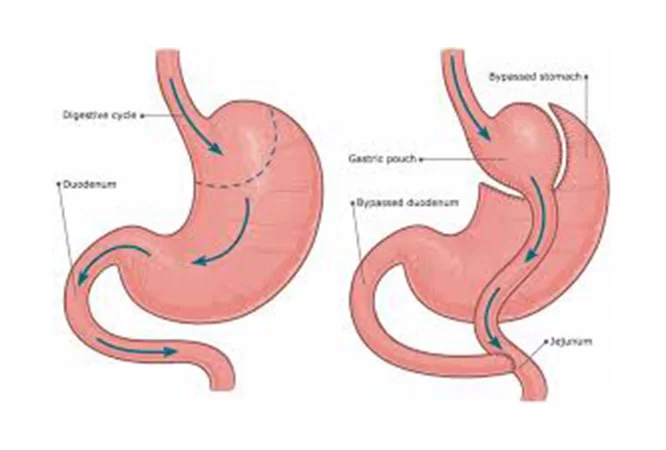Gastric Bypass
- Home Page
- Gastric Bypass

gastric bypass: a life-changing weight loss surgery
Gastric Bypass is a popular and effective weight loss surgery for individuals struggling with obesity. Obesity affects more than 10% of the global population and is linked to serious health issues such as type 2 diabetes, heart disease, and even cancer. The surgery helps reduce excess body fat and addresses the health risks associated with obesity.
what is gastric bypass?
Gastric Bypass surgery, also known as Roux-en-Y gastric bypass, is a widely used weight-loss procedure. It involves two main steps:
-
Creation of a Stomach Pouch:
The surgeon divides the stomach into a small pouch and a larger portion. The new, smaller pouch can only hold about 200-300 milliliters, limiting the amount of food you can eat, helping you feel full faster. -
The Bypass:
The smaller stomach pouch is connected to the small intestine, bypassing the first part of the intestine. This limits the body’s ability to absorb calories and nutrients, further supporting weight loss.
benefits of gastric bypass
By making small lifestyle changes and following a healthy diet, patients can achieve significant weight loss and improve their overall health. Some benefits of gastric bypass include:
- Effective weight loss: Lose around 30-50% of excess body weight within six months.
- Improved health: Reduces the risk of obesity-related conditions like heart disease, diabetes, and high blood pressure.
- Faster weight loss: Compared to other procedures, gastric bypass results in quicker weight loss due to dietary restrictions and reduced nutrient absorption.
what to expect after surgery
After gastric bypass surgery, most patients spend 2-3 days in the hospital and can return to normal activities within 2-3 weeks. Complications are rare, but it’s important to follow your surgeon’s recommendations to ensure a smooth recovery.
post-surgery diet
Your diet will change significantly after surgery. The clinic will provide detailed guidelines to help your stomach heal and adjust to smaller meals. Key recommendations include:
- Small portions: Eat smaller amounts to avoid overfilling your stomach.
- Stay hydrated: Drink about 9 glasses of water a day, but avoid drinking with meals.
- Protein first: Focus on protein-rich foods to support your body’s healing.
- Avoid high-fat and sugary foods: These can lead to discomfort and weight gain.
You’ll gradually move from liquids to soft foods, and finally to solid foods over a period of 2-3 months.
gastric bypass in turkey
Turkey is a leading destination for weight loss surgeries like gastric bypass. With high-quality healthcare facilities and affordable prices, thousands of patients choose Turkey for their medical needs. The rising trend of medical tourism has made Turkey a popular option for those looking for effective, low-cost obesity treatments.
gastric bypass costs in turkey
Gastric bypass surgery in Turkey is significantly more affordable compared to other countries, thanks to the competitive pricing and high standards of medical care. Clinics in Turkey offer personalized treatment plans at reasonable costs, making it an attractive option for many patients.
| Gastric Bypass Operations Card | Details |
|---|---|
| Duration of Operation | 1-2 hours |
| Anesthesia Type | General Anesthesia |
| First Shower | 48 hours |
| Age Limit | No Age Limit |
| Hospitalize | 1-3 days |
| Pain Threshold | Moderated discomfort |
| Edema Status | One week |
| Complications | None |
